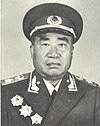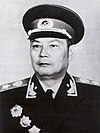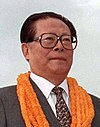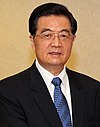فہرست صدور عوامی جمہوریہ چین
یہ فہرست صدور عوامی جمہوریہ چین (List of Presidents of the People's Republic of China) ہے۔
فہرست
- چینی قیادت کی نسلیں
پہلی انتظامیہ دوسری انتظامیہ تیسری انتظامیہ ہو وین انتظامیہ شی لی انتظامیہ
مرکزی عوامی حکومت (1949–1954)
- چیئرمین مرکزی عوامی حکومت
| تصویر | نام (عمر) | مدت عہدہ | نائب چیئرمین | |||
|---|---|---|---|---|---|---|
| – | ماؤ زے تنگ 毛泽东 (1893–1976) | 1 اکتوبر 1949 | 27 ستمبر 1954 | ژو دے لیو شاوچی سونگ چنگ لنگ Li Jishen Zhang Lan Gao Gang | ||
پہلا آئین (1954–1975)
- چیئرمین عوامی جمہوریہ چین
| تصویر | نام (عمر) انتخابی حلقہ | مدت عہدہ | نیشنل پیپلز کانگریس | نائب چیئرمین | |||
|---|---|---|---|---|---|---|---|
| 1 | ماؤ زے تنگ 毛泽东 (1893–1976) بیجنگ | 27 ستمبر 1954 | 27 اپریل 1959 | پہلی | ژو دے | ||
| 2 |  | لیو شاوچی 刘少奇 (1898–1969) بیجنگ | 27 اپریل 1959 | 3 جنوری 1965 | دوسری | سونگ چنگ لنگ دونگ بیوو | |
| 2 جنوری 1965[1] | 31 اکتوبر 1968[2] | تیسری | |||||
| – |  | دونگ بیوو 董必武 (1886–1975) ہوبئی | 24 فروری 1972 | 17 جنوری 1975 | تیسری | Vacancy by ascension[حوالہ درکار] | |
دوسرا اور تیسرا آئین (1975–1982)
- چیئرمین قائمہ کمیٹی نیشنل پیپلز کانگریس
| تصویر | نام (عمر) انتخابی حلقہ | مدت عہدہ | نیشنل پیپلز کانگریس | نائب چیئرمین | |||
|---|---|---|---|---|---|---|---|
| – |  | ژو دے 朱德 (1886–1976) سیچوان | 17 جنوری 1975 | 6 جولائی 1976 | چوتھی | سونگ چنگ لنگ[3] دونگ بیوو[3] (died 2 اپریل 1975) and others | |
| – |  | سونگ چنگ لنگ 宋庆龄 (1893–1981) شنگھائی | 6 جولائی 1976 | 5 مارچ 1978 | چوتھی | ||
| After Zhu De's death, Song Qingling served as acting Chairwoman of the Standing Committee of the National People's Congress for the remainder of the 4th National People's Congress's term.[حوالہ درکار] | |||||||
| – |  | یے جیان ینگ 叶剑英 (1897–1986) پیپلز لبریشن آرمی | 5 مارچ 1978 | 18 جون 1983 | پانچویں | سونگ چنگ لنگ and others | |
- عزازی صدر عوامی جمہوریہ چین
| تصویر | نام پیدائش-وفات) انتخابی حلقہ | مدت عہدہ | نیشنل پیپلز کانگریس | Notes | ||
|---|---|---|---|---|---|---|
| – |  | سونگ چنگ لنگ 宋庆龄 (1893–1981) شنگھائی | 16 مئی 1981 | 28 مئی 1981 | پانچویں | Shortly before her death, Song Qingling was named Honorary President of the People's Republic of China. |
چوتھا آئین (از 1983)
| تصویر | نام (عمر) انتخابی حلقہ | مدت عہدہ | نیشنل پیپلز کانگریس | نائب صدر | ||
|---|---|---|---|---|---|---|
| 3 |  | لی شیان نیان 李先念 (1909–1992) ہوبئی | 18 جون 1983 | 8 اپریل 1988 | چھٹی | Ulanhu |
| He started reforms in foreign policy and China began opening to the world. He was first Chinese president who visited USA. He was also the first state president who officially visited شمالی کوریا. In 1984, Li met with US President رونالڈ ریگن during Reagan's visit to China, notably discussing the status of جمہوریۂ چین with the President. In 1988, Li resigned from his position as صدر عوامی جمہوریہ چین and was replaced by یانگ شانگکون. Li was then named Chairman of the National Committee of the CPPCC.[4] | ||||||
| 4 |  | یانگ شانگکون 杨尚昆 (1907–1998) PLA | 8 اپریل 1988 | 27 مارچ 1993 | ساتویں | Wang Zhen |
| Yang promoted economic reform but opposed political liberalization, a position which دنگ شاوپنگ eventually came to identify with. Yang reached the height of his political career after the Tiananmen Square protests of 1989, but his organized opposition to جیانگ زیمین's leadership led Deng to force Yang to retire. | ||||||
| 5 |  | جیانگ زیمین 江泽民 (پیدائش 1926) شنگھائی | 27 مارچ 1993 | 15 مارچ 1998 | آٹھویں | Rong Yiren |
| 15 مارچ 1998 | 15 مارچ 2003 | نویں | ہوجنتاؤ | |||
| Under his leadership, China experienced substantial developmental growth with reforms, saw the peaceful return of Hong Kong from the United Kingdom and Macau from Portugal, and improved its relations with the outside world while the Communist Party maintained its tight control over the government. Jiang has been criticized for being too concerned about his personal image at home, and too conciliatory towards Russia and the United States abroad.[5] Served as Mayor of Shanghai (1985–1989), چیئرمین مرکزی فوجی کمیشن (1990–2005) | ||||||
| 6 |  | ہوجنتاؤ 胡锦涛 (پیدائش 1942) تبت (2008) جیانگسو ( 2008) | 15 مارچ 2003 | 15 مارچ 2008 | دسویں | Zeng Qinghong |
| 15 مارچ 2008 | 14 مارچ 2013 | گیارہویں | شی جن پنگ | |||
| During his term in office, Hu reintroduced state control in some sectors of the economy that were relaxed by the previous administration, and has been conservative with political reforms.[6] Along with his colleague, وزیر اعظم چین Wen Jiabao, Hu presided over nearly a decade of consistent economic growth and development that cemented China as a major world power. He sought to improve socio-economic equality domestically through the Scientific Development Concept, which aimed to build a "امن و آشتی والا سماج" that was prosperous and free of social conflict.[7] In foreign policy, Hu advocated for "China's peaceful development", pursuing soft power in international relations and a business-oriented approach to diplomacy. Through Hu's tenure, China's influence in افریقا, لاطینی امریکہ, and other developing countries has increased.[8] Served as Vice President (1998–2003) | ||||||
| 7 |  | شی جن پنگ 习近平 (پیدائش 1953) شنگھائی | 14 مارچ 2013 | بر سر اقتدار | بارہویں | Li Yuanchao |
| بطور نائب صدر (2008–2013). | ||||||
حوالہ جات
🔥 Top keywords: صفحۂ اولخاص:تلاشانا لله و انا الیه راجعونمحمد بن عبد اللہحق نواز جھنگویسید احمد خانپاکستاناردوغزوہ بدرمحمد اقبالجنت البقیععلی ابن ابی طالبقرآنعمر بن خطابانہدام قبرستان بقیعحریم شاہغزوہ احداردو حروف تہجیاردو زبان کی ابتدا کے متعلق نظریاتابوبکر صدیقاسلاممحمد بن اسماعیل بخاریکوسغزوہ خندقخاص:حالیہ تبدیلیاںاسماء اللہ الحسنیٰجناح کے چودہ نکاتفلسطینموسی ابن عمراندجالمیری انطونیامتضاد الفاظمرزا غالبآدم (اسلام)پریم چندفاطمہ زہراصحیح بخاریجنگ آزادی ہند 1857ءضمنی انتخابات